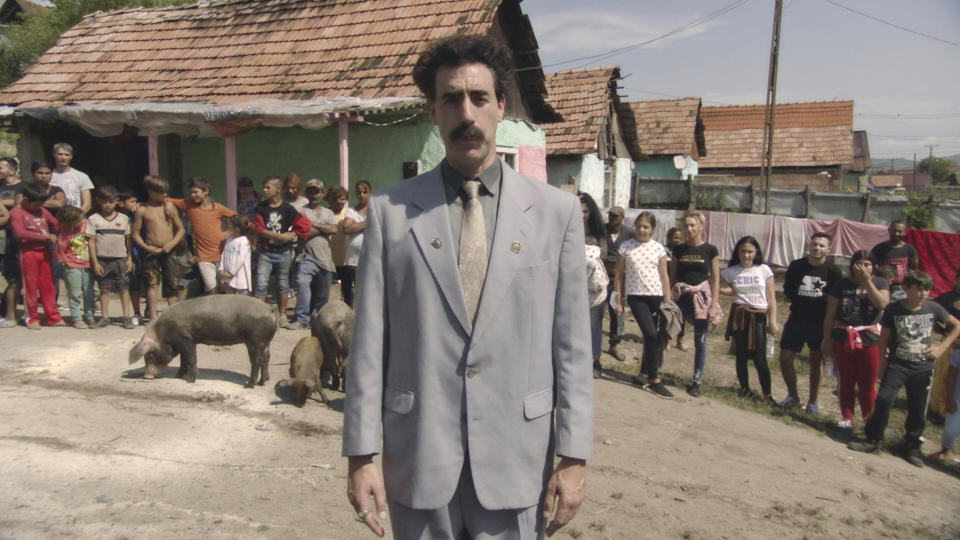Kazakhstan hated Borat. Now it's adopting his catchphrase.
- Oops!Something went wrong.Please try again later.
When the first "Borat" movie came out in 2006, Kazakhstan reacted by banning the film, threatening to sue its creator, Sacha Baron Cohen, and buying a four-page ad in American newspapers packed with positive stories about the Central Asian country.
What a difference 14 years makes.
After the sequel, "Borat Subsequent Moviefilm," was released last week, the Kazakh tourist board adopted one of the character's well-worn sayings, "Very nice!" as one of its own slogans.
In a series of 12-second, social media-friendly clips, one visitor is seen climbing through a stunning mountain range, another drinks Kazakh fermented tea, and a third admires one of the country's modern skylines — all exclaiming: "Very nice!"
The strategy is a headline-grabbing piece of PR at a time when global tourism has been strangled by Covid-19. But leaning into Borat's world is a left-field move given that the films depict this predominantly Muslim, ex-Soviet republic of 18 million people as a backward land populated by misogynists and anti-Semites.
The idea was the brainchild of an American named Dennis Keen, a Los Angeles native who in 2013 moved to Kazakhstan where he now runs the tour company Walking Almaty.
"When people back home talk about Kazakhstan their knowledge often starts and ends with Borat, so I think it was a missed opportunity not to capitalize on the first film," he told NBC News by telephone.
As soon as he saw the teaser for the new movie on Amazon Prime Video, he said he pitched his idea to the tourist board and they accepted immediately.
"They just said, 'This is perfect, it's exactly what we're looking for,'" he said. "It's a good phrase on its own because Kazakhstan is a 'very nice' country, but the fact that it has this tongue-in-cheek element that plays into the Borat catchphrase is what makes it fun."
Kairat Sadvakassov, the deputy chairman of Kazakh Tourism, explained the shift.
"Kazakhstan's nature is very nice, its food is very nice, and its people, despite Borat’s jokes to the contrary, are some of the nicest in the world," he said in a statement, urging people to visit so they can see "Borat's homeland is nicer than they may have heard."
Despite the government's protests at the time, the first movie actually appears to have boosted tourism; visas to Kazakhstan increased tenfold, according to the AFP news agency.
Nevertheless the U-turn is striking for the previously resolute Kazakh authorities, and one that hints at the complex debate over satire and identity that both films have provoked.
Born to Jewish parents in London, Cohen has established himself as one of the world's leading satirists. He has duped celebrities with personas such as "Ali G" — the suburban hip-hop wannabe — and the Austrian fashion reporter "Brüno."
But Borat Sagdiyev is his most well known: a Kazakh TV journalist whose bigoted views are used to expose Americans he encounters while traveling through the United States.

Among the new film's targets is Rudy Giuliani, President Donald Trump's personal lawyer. Giuliani later denied doing anything "inappropriate" after the film featured him being invited into a hotel room by a young woman posing as a journalist, before reaching into his pants to untuck his microphone.
Cohen says his version of Kazakhstan is nothing like the real country, but was rather chosen as somewhere few Americans had heard of, ideal for the cartoonish homeland of his character. Other commentators see it as a deliberately inaccurate post-Soviet parody, aimed at exposing the prejudices of the films' real target: Americans, rather than ridiculing Kazakhs themselves.
Not everyone agrees. The Kazakh American Association, a non-profit based in Virginia, wrote a letter last week demanding that Amazon pull the movie.
The association called it "a racist film which openly berates, bullies and traumatizes a nation comprised of people of color," and alleged that "this film incites violence against a highly vulnerable and underrepresented minority ethnic group."
NBC News has reached out to Amazon for a comment on the letter.

